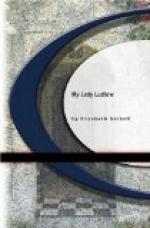But I am wandering away from my lady, and her dislike to all innovation. Now, it seemed to me, as far as I heard, that Mr. Gray was full of nothing but new things, and that what he first did was to attack all our established institutions, both in the village and the parish, and also in the nation. To be sure, I heard of his ways of going on principally from Miss Galindo, who was apt to speak more strongly than accurately.
“There he goes,” she said, “clucking up the children just like an old hen, and trying to teach them about their salvation and their souls, and I don’t know what—things that it is just blasphemy to speak about out of church. And he potters old people about reading their Bibles. I am sure I don’t want to speak disrespectfully about the Holy Scriptures, but I found old Job Horton busy reading his Bible yesterday. Says I, ’What are you reading, and where did you get it, and who gave it you?’ So he made answer, ’That he was reading Susannah and the Elders, for that he had read Bel and the Dragon till he could pretty near say it off by heart, and they were two as pretty stories as ever he had read, and that it was a caution to him what bad old chaps there were in the world.’ Now, as Job is bed-ridden, I don’t think he is likely to meet with the Elders, and I say that I think repeating his Creed, the Commandments, and the Lord’s Prayer, and, maybe, throwing in a verse of the Psalms, if he wanted a bit of a change, would have done him far more good than his pretty stories, as he called them. And what’s the next thing our young parson does? Why he tries to make us all feel pitiful for the black slaves, and leaves little pictures of negroes about, with the question printed below, ‘Am I not a man and a brother?’ just as if I was to be hail-fellow-well-met with every negro footman. They do say he takes no sugar in his tea, because he thinks he sees spots of blood in it. Now I call that superstition.”
The next day it was a still worse story.
“Well, my dear! and how are you? My lady sent me in to sit a bit with you, while Mr. Horner looks out some papers for me to copy. Between ourselves, Mr. Steward Horner does not like having me for a clerk. It is all very well he does not; for, if he were decently civil to me, I might want a chaperone, you know, now poor Mrs. Horner is dead.” This was one of Miss Galindo’s grim jokes. “As it is, I try to make him forget I’m a woman, I do everything as ship-shape as a masculine man-clerk. I see he can’t find a fault—writing good, spelling correct, sums all right. And then he squints up at me with the tail of his eye, and looks glummer than ever, just because I’m a woman—as if I could help that. I have gone good lengths to set his mind at ease. I have stuck my pen behind my ear, I have made him a bow instead of a curtsey, I have whistled—not a tune I can’t pipe up that—nay, if you won’t tell my lady, I don’t mind telling you that I have said




